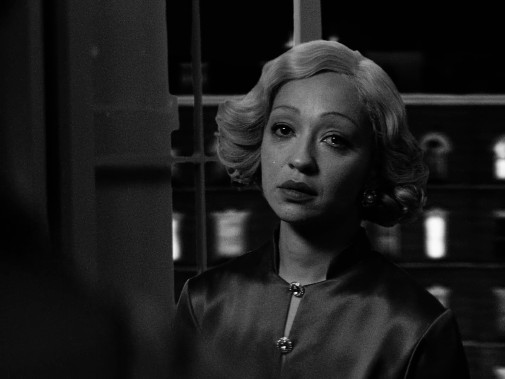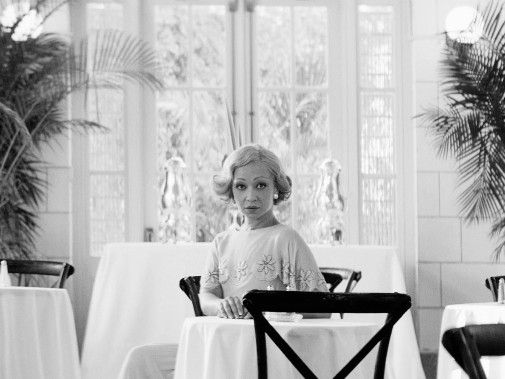
Earlier in the awards season, I became discouraged at the thought that the year's best performance was doomed. Critics didn't rally behind Ruth Negga as I had hoped, and her film, no matter how spellbinding, looked likely to be ignored. Despite such worries the arrival of prominent Oscar precursors and industry awards has revitalized hope. After Globe and SAG nominations, Negga is poised to earn a second Academy Award nomination for her supporting turn as Clare Bellew in Rebecca Hall's cinematic adaptation of Nella Larsen's novel Passing. But of course, even when a nod feels secure, it's never a bad idea to gild the lily and remind folks of an actress's genius…
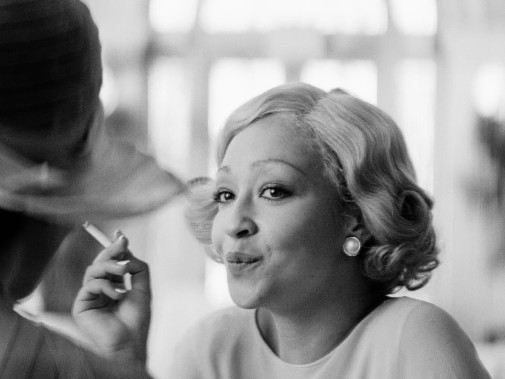
We first meet Clare when Passing's true protagonist happens to cross her path by pure chance. Irene (Tessa Thompson) is a Black woman in 1920s New York who uses passing as an occasional access key into white spaces. They are those segregated havens where her people can only openly exist as the help, regardless of wealth—spaces like a tea room, a beautiful salon where her eyes happen to fall upon a vision. A blonde beauty out of a fairytale, Clare Bellew is like a ghost from the past who comes floating on a cloud of flowery sweetness, ready to rock Irene's world. They used to be friends once upon a time. Maybe more. As we soon discover, Passing is an exercise in endless "maybes."
Unlike Irene, Clare has made passing her entire life. She's a putative free spirit who has traded in her freedom for privilege, shackling herself to an illusory identity that denies part of who she is. Clare is in a trap of her own making – what's more, she knows it and chooses to remain trapped. So perfect is the illusion born out of delusion that her old friend doesn't recognize her at first. It takes a giggle. Her laugh tinkles and twinkles, a thrilling chirp of self-satisfied amusement that reveals Clare's identity to Irene. When she speaks, it's even more unshakeable, the sort of sound one would never forget. Like Daisy Buchanan, her voice is full of money.
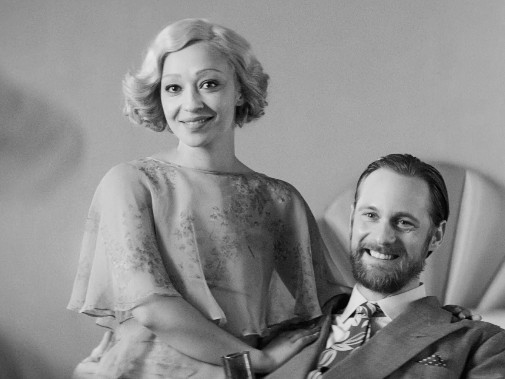
Employing fluttering eyes and the nervous grasp of a cigarette, Negga projects a picture of Old Hollywood artifice. She's Jean Harlow before Jean Harlow, the peroxided halo of blonde hair and all. However, there's humor in the falsity, even if only Clare herself is tickled by her own witticisms and risky suggestions. She's all manufactured glamour whose splendor is essentially fragile. A stiff breeze could undo it. Or perchance an attentive look. "I have everything I ever wanted," she says. The delivery is full of confidence, but her face betrays a flicker of doubt. A gentle smile wanes a tad, the slight curve flattening a millimeter, just enough for the camera to perceive.
Laughter and tension abound as the conversation goes from a tea room to a hotel room. The situation is only made trickier by the appearance of Clare's husband, a racist boor who's perfectly unaware that he's married to a person he purports to hate. Glancing at her female companion, Clare stares a coded message, a cruel joke, a plaintive plea for silent understanding. She's irritating but seductive, a conundrum few can solve. Negga can, though, and so can Hall, her cinematographer, and editor. Together, they devise ways to make her legible on-screen. Though, too much understanding is forbidden. In fundamental ways, Clare remains an enigma to the very end.
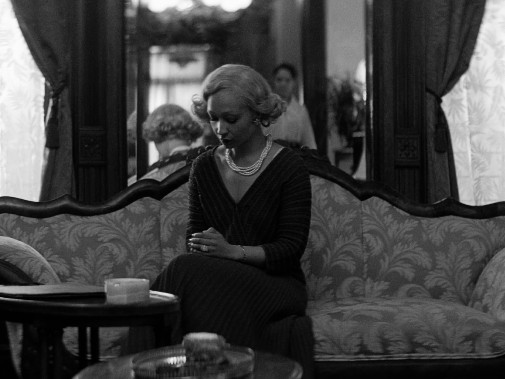
With that in mind, it's easy to see how the character could have been played as an unreachable object of desire (for the camera and the characters), an F. Scott Fitzgerald archetype of luminous green light. And yet, Negga makes her curious and needy, tragically eager to be reached, seen, even broken. While acting something of a cipher, the thespian also delineates a desirous being, not an object or a mirage. Her humanity hurts, a razor of beauty giving us a kiss that draws blood. So much so, that we don't need to know the contents of Clare's letters to learn about the loneliness of her pale life.
When insinuating herself into Irene's home, her quotidian anger comes out like a melodramatic performance that's verging on self-awareness. Snubbed, Clare arrives in furs and pearls, tremulous line deliveries, somersaulting eyebrows that move like those of a particularly expressive silent movie starlet. Such theatrics don't mean the emotion behind them is false. If anything, in these moments, Clare's affectations work more as a magnifying glass than a smokescreen. These things sound impossible to reconcile, yet it all somehow makes sense within the realms of Clare, her abstract personhood, her screen presence.
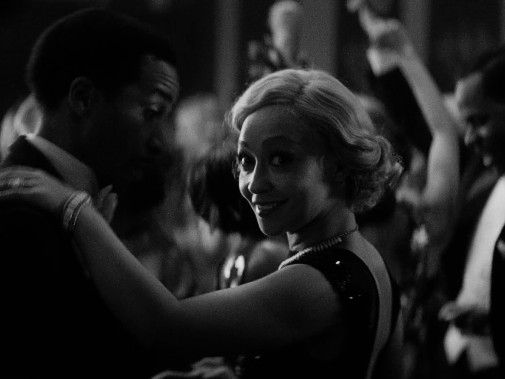
Perchance the biggest contradiction of all is how a woman who ran away from her Blackness now seeks the company of Black folks. Examining Clare's behavior through a cold consideration, one sees how she yearns to find her way back into the community she once abandoned. Like all interesting people, Clare is a woman full of willful paradoxes. It's a testament to Ruth Negga's skill that she can take all of this and make it make sense, both as dramaturgy and human psychology. Furthermore, it's up to Negga and costar Tessa Thompson to negotiate the limits and dangers of Clare and Irene's friendship, based on obsession, jealousy, aspiration, hate, and want.
Does Irene find Clare repugnant? Does she find her threatening, perhaps? Maybe she wants to kill the woman. Maybe she wants to kiss her, to have her in all the ways known to man and even some still unknown. If Thompson must project this web of desiring possibilities, Negga needs to become worthy of fascination so that all those reactions feel grounded. Regard her when dancing, and you'll see it in full effect. Her happiness is magnetic, an electric current emanating from the body on-screen and connecting to those watching outside the cinematic window. She moves, the camera follows as if inebriated by her extraordinary beauty. It takes a star to be looked at like that and not feel ridiculous.
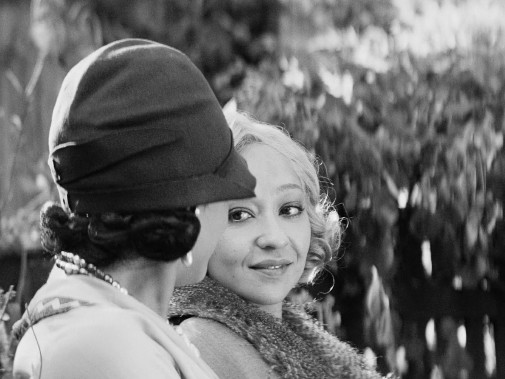
Later, when speaking of the past, of how she always admired Irene and how they are nothing alike, Clare is also full of yearning. It's not delicate in how it manifests. Instead, it's verging on brutish and forceful, a faint guttural sound from deep within, barely contained by gentle words. Intellectually, it should sound just as lovely as every other one of Clare's airy pronouncements. Nevertheless, an edge of ugliness shines through, spoiling the fruit of pleasantness. It rots on the branch, stinking up the place with a stench of death. Indeed, when her husband returns to the city, Clare becomes fatalistic.
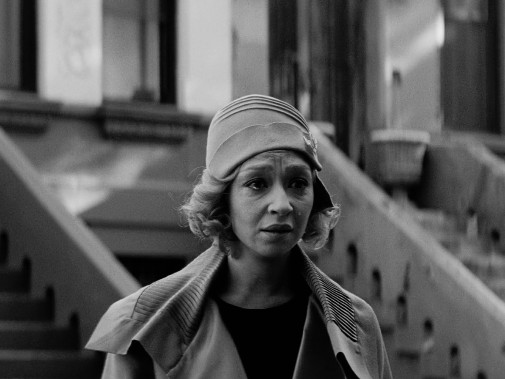
By that point, her return to a Black community starts to feel a lot like a self-annihilating need fulfilled. If she's found out, her life will be over. Maybe she wants that fracturing end, the final stroke that shatters the illusion. Or does she? There's a bit of Huppertian minimalism, a hint of strategic reticence about her technique. Leaving enough up in the air, she allows the audience to fill in the blanks with their assumptions, thus becoming a mirror for the spectator rather than a mere surface for passive admiration. That being said, such conclusions leave something to be desired. Negga is brilliant, not because of the voids she peppers throughout Clare's construction.
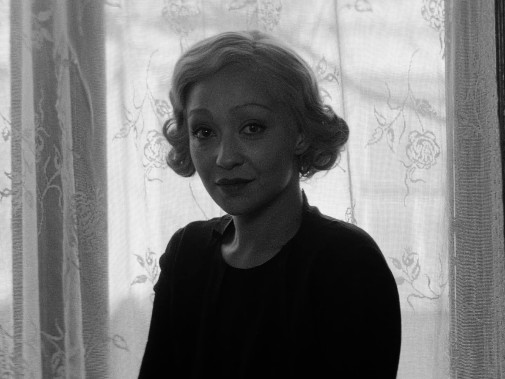
On the contrary, she achieves ambiguity through a surplus of possibility, a universe contained within a single woman. Much has been written about the specific nature of Irene's intentions upon that open window. Still, the most exciting question remains what's going on beneath the porcelain mask of Clare's expression. Is her downturned eye to Irene an apology? Is it a farewell full of fatalistic despair? A condemned woman, a tragic heroine faces her inevitable end. Maybe it's the forlorn acceptance of the abyss. But, on the other hand, it can also be the defiance of a long-suffering wife. All is right, all is wrong. Again, the maybes and an actress's portrayal that encompasses universes. Clare is infinite.
It's a lucid miracle of anti-naturalistic mannered performance, a balancing act that deserves gold, standing ovations, and endless love. Indeed, Ruth Negga deserves the world, but, for now, an Oscar will do.
